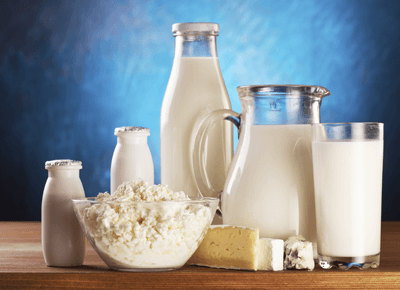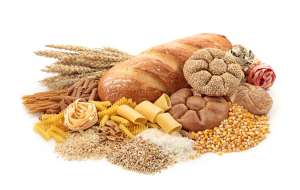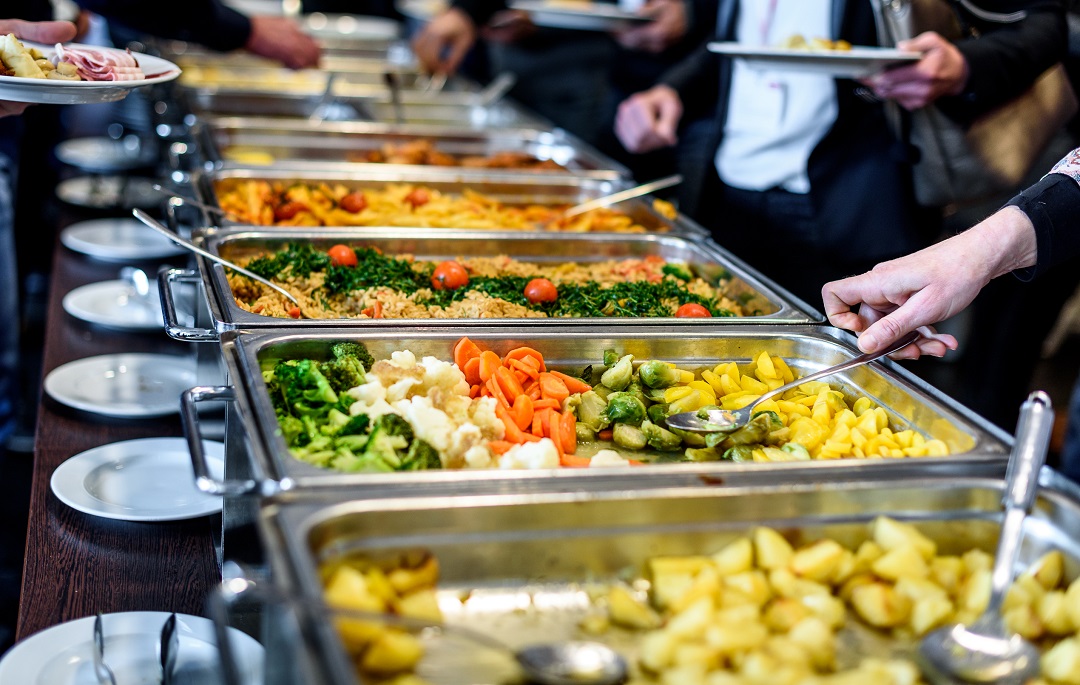A Closer Look at Wheat, Milk and Egg Allergies
In Monday’s post “10 Things Meeting Professionals Need to Know About Food Allergies” I mentioned that wheat, eggs and milk are three of the top eight foods that cause 90 percent of all allergic reactions in people worldwide.
As part of my continuing recognition of Food Allergy Awareness Week (May 11-18), I’m going to provide a closer look at wheat, egg and milk allergies and where they are found in meeting menus.
So many foods these days are made with wheat, egg and/or milk that allergic individuals should pay close attention to the ingredients of just about everything they eat.
Reactions from ingesting, inhaling or touching them can range from mild—such as hives, itching, and swelling—to severe, with wheezing, difficulty breathing and even anaphylaxis, a sometimes fatal reaction that can come on quickly.
Some foods that contain these allergens are obvious, like pizza. But others, like baked goods and candy, may not be so obvious. So what’s a meeting planner to do? Read on to find out.
Wheat Allergy
Wheat the principal cereal grain grown in the United States, can be found in a variety of products, not just food. This article in Huffington Post last year talks about five unexpected sources of gluten (wheat), one of four proteins found in wheat, that aren’t food.
Most everyone knows wheat is used in breads, cakes, breakfast cereals, pasta and crackers. But did you know that wheat, or ingredients derived from wheat, such as wheat germ oil and gluten, also sneak their way into beer, soy sauce, ketchup, shampoos, make-up, lotion, soap, sunscreen and even medicine?
Sometimes a wheat allergy may be confused with gluten intolerance or celiac disease, but the causes and symptoms are different. A wheat allergy is an overreaction of the immune system to one or all of the food proteins found in wheat. Gluten intolerance and celiac disease are caused by an immune system overreaction, specifically to gluten, one of proteins in wheat (as well as rye and barley), localized to the small intestine.
Although not immediately life-threatening like an allergy, gluten intolerance and celiac disease can cause serious complications, including malnutrition and intestinal damage, and leave a person debilitated for days or weeks.
Some individuals who are allergic to wheat can often tolerate other grains. However, about 20 percent of children with wheat allergy also are allergic to other grains. If an attendee says they are allergic to wheat, non just gluten-free, be sure to ask them whether other grains will pose an issue.
 Egg Allergy
Egg Allergy
Did you know that approximately 75 billion eggs are produced in the United States (10% of the world’s supply) each year?
That’s six billion eggs per month, used by consumers (60%), prepared by the foodservice industry (9%) or turned into egg products (21%) used to make foods like cake mixes and mayonnaise that foodservice operators use to create meals we eat in restaurants, hotels and convention centers.
Ironically, as noted above, that little, ubiquitous egg also happens to be one of the eight most common food allergens, affecting more than 600,000 Americans.
While the white of an egg contains the allergenic proteins, event participants with an egg allergy must strictly avoid all eggs and egg products, including the yolks. That’s because it is nearly impossible to separate the egg white completely from the yolk, making the risk of cross-contact huge.
Research shows that about 70 percent of egg-allergic individuals outgrow the allergy by age 16, but a lifelong allergy is not uncommon.
Most people know eggs are contained in baked goods such as cakes and muffins, but they may not realize they are also in foods such as canned soups, salad dressings, ice cream, and meat-based dishes like meatballs and meatloaf. Unfortunately, some commercial egg substitutes contain egg protein as well.
Milk Allergy
An allergy to cow’s milk is the most common food allergy in infants and young children. While most children outgrow the allergen by age 10, sometimes it can be lifelong.
As with all allergies, sensitivity to cow’s milk varies by individual. Some people may have a severe reaction after ingesting a very small amount while others may have only a mild reaction after ingesting a modest amount of milk.
Milk allergy should not be confused with lactose intolerance.

Unlike food allergies, food intolerances do not involve the immune system. Event participants who are lactose intolerant are missing the enzyme lactase, which breaks down lactose, a sugar found in milk. And because of this, they are unable to digest milk and other dairy products and may experience nausea, cramps, gas, bloating and diarrhea. While lactose intolerance can cause great discomfort, it is not life-threatening.
In summary, because wheat, milk and eggs are used in a lot of pre-packaged and processed foods, vigilant label-reading is imperative as well as asking chefs about ingredients and preparation methods before serving to these guests with wheat, milk and egg allergies.
For an listing of typical catering menu items that may contain wheat, milk and eggs, click here. Please note that the list is not exhaustive; rather, it highlights examples of where wheat, milk and eggs are most commonly found or have been unexpectedly found. Neither does it imply that wheat, milk and eggs are always present in these foods—a chef or manufacturer may be proactive and creative, using alternative ingredients—but it serves as a reminder to talk with your catering partners about ingredients before serving an item to your food allergic attendees.
Help build broader support food allergy awareness in Congress
Visit the FARE Action Center and click on the Build Congressional Awareness Resolution action item to contact your representative. Urge them to cosponsor the Congressional resolution by Congressmen Steve Israel (NY) and Michael McCaul (TX) to recognize Food Allergy Awareness Week. The text of the resolution is available here.
Again Here’s what I’ll be sharing this week.
Monday — 10 Things Meeting Professionals Need to Know About Food Allergies
Tuesday — A Closer Look at Wheat Milk and Egg Allergens
Wednesday — 5 Ways to Advocate for Your Food Allergic Event Participants
Thursday — A Closer Look at Tree Nut and Peanut Allergens
Friday — 10 Frequently Asked Questions about Food Allergies
Saturday — A Closer Look at Soy, Shellfish and Fish Allergens





8 Comments
Nora Curran
I’m type o blood and I’m told I’m alergicto to wheat So I got this healthy bread recipe ,,I THOUGHT, RYE FLOUR SPELT FLOUR AND OATMEAL I was exhausted after I ate my breakfast everyday because the bread is so delicious I thought I was dying No energy whatsoever totally spend So one day I had to go without breakfast for medical reasons Well I was so surprised and so happy I just didn’t get tired at all So is wheat the same as rye and spelt
Tracy Stuckrath
Nora,
Spelt, rye and wheat are similar in that they each contain gluten.
Tracy
Michelle
No spelt is ok. Rye is not ok
Michelle
Yes true spelt is not ok. Buckwheat is it meant to say☺
Julia Marshall
It is weird that these allergies are becoming more common. I know quite a few people who display the symptoms of egg white allergies or intolerance even if they eat something simple like a homemade burger. Even the small amount of egg white that is used to bind them seems to set off their symptoms.
Tracy Stuckrath
I agree, Julia. And, unfortunately, everyone’s reactions and triggers are different. Frustrating from all vantage points.
Carolyn Cornie
First of all, your blood type is inconsequential…no connection to what you should eat at all. This fallacy earns some people a lot of money. What if ‘hair color’ had a specific diet…or blue or brown eyes. These things are genetic. …. It could be that a high carbohydrate intake at breakfast did not satisfy YOUR body’s need for protein early in the day and/or how it was metabolized. And when you stopped the ‘bread at breakfast’ habit, that was a major drop in the carbs….and your system wasn’t wasting ‘energy’ trying to digest them, but leaving that ‘energy’ for you.
Andrea Christos
The fundamental problem is that the grains grown in this country and fed to humans and animals alike have been genetically modified making them impossible to be properly utilized and digested. Organic could be the better option, but the seeds themselves are mutated.
Comments are closed.